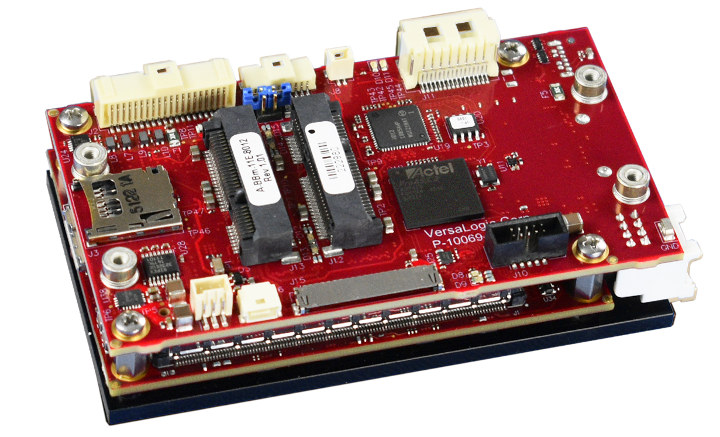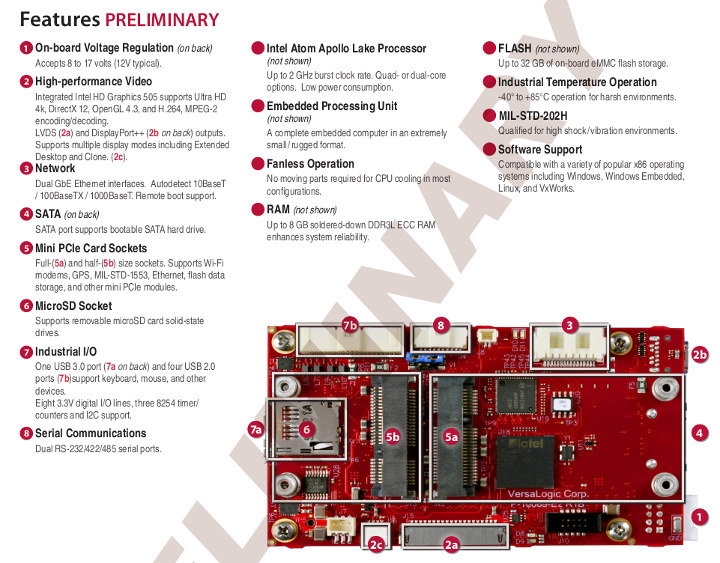Back in 2016, we wrote about VersaLogic Osprey industrial and military-grade computer based on Intel Atom Bay Trail processor, and slightly larger than a credit card.
The company is now back with an upgrade with many of the same features, and the exact form factor, but VersaLogic Harrier comes with a choice of more powerful dual-core and quad-core E39xx Apollo Lake processors.

VersaLogic Harrier (VL-EPU-4011) board specifications:
- SoC – Intel Atom E3930 dual-core @ 1.3 GHz or E3950 quad-core @ 1.6 GHz Apollo Lake processor with Intel HD Graphics 505
- System Memory – 2GB or 8GB ECC-DDR3L (soldered)
- Storage
- 8GB or 32GB eMMC flash
- MicroSD slot
- SATA 2.0 port with latching connector
- mSATA via mini-PCIe slot
- Display
- Single-channel 18/24-bit LVDS up to 1024×768 @ 60Hz
- 1x mini-DisplayPort++ with HDMI and audio support up to 4096×2160
- Connectivity – 2x Gigabit Ethernet ports with latching connector, network boot option on one of the ports.
- USB – 1x USB 3.0, 4x USB 2.0
- I/O expansion – 2x RS-232/422/485; 8x DIO; 1x I2C; 3x timers/counters
- Expansion:
- Full-sized mini-PCIe socket with support Wi-Fi modems, GPS receivers, MIL-STD-1553, Ethernet channels, non-volatile flash data storage, and other plug-in modules (full or half-size). USB, SATA, and PCIe signaling. Autodetect mSATA support.
- Half-sized mini-PCIe socket with support for PCIe and USB
- Security – TPM 2.0 security chip
- Misc – Watchdog timer, system reset, hardware monitoring, optional passive heatsink, cooling fan, and heat pipe connector plate, connector for RTC battery
- Power Supply – 8V to 17V (nominal 12V operation)
- Power Consumption
- Dual-core model with 2GB RAM, 8GB eMMC flash – Idle: 4.6W; typical: 5.5W; max: 6.2W; ACPI S3: 1.2W
- Quad-core model with 8GB RAM, 32GB eMMC flash – Idle: 7.3W; typical: 8.8W; max: 10.2W; ACPI S3: 1.2W
- Dimensions – 95 x 55 x 27.5mm
- Weight – 140 grams
- Temperature range – -40 to 85°C
- Vibration and mechanical shock – MIL-STD-202H
- Altitude – Operating: Up to 4,570m; storage: up to 12,000m

The board ships with a bolt-on heat plate for cooling by default, the company also offers optional heat sink, fan, heat pipe, and other thermal accessories.
Just like its predecessor, the Harrier board runs Linux, VxWorks, Windows, and Windows Embedded. The company also offers a variety of accessories and mPCIe modules.
There are two standard models namely VL-EPU-4011-EDP-08X-32 (Atom E3950 + 8GB RAM and 32GB eMMC flash) and “VL-EPU-4011-EAP-02X-08” (Atom E3930 + 2GB RAM + 8GB eMMC flash), but pricing is not currently available and mass production is scheduled for Q1 2020.
But for reference, the earlier Osprey board sold for around $1,000 and up when it launched in 2016, so I’d expect similar pricing for the new Harrier board. The relatively high price is due to industrial and military standards compliance, as well as the related selection of industrial-grade components.
You can visit the product page for more information.

Jean-Luc started CNX Software in 2010 as a part-time endeavor, before quitting his job as a software engineering manager, and starting to write daily news, and reviews full time later in 2011.
Support CNX Software! Donate via cryptocurrencies, become a Patron on Patreon, or purchase goods on Amazon or Aliexpress





I purchased 4 Harrier boards and all of them have problems. The RS485 just does not work and the board will not detect my Samsung HDMI monitor nor my Dell 4K monitor using mini DP to HDMI cable. Frustration isn’t a strong enough word for me. They evidently emulate real hardware in an FPGA, why? Why not just add a mil spec UART chip?